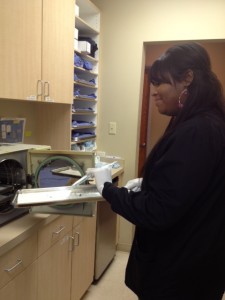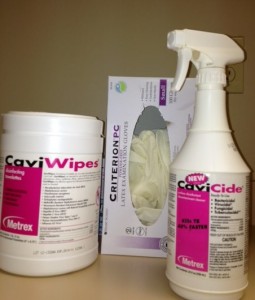Patient safety in the oral surgeon’s office is at the top of people’s minds this week due to recent developments in the news regarding infection control. While the world will always have a few people in it who behave irresponsibly and without regard for others, the good news is that the overwhelming majority of healthcare providers take patient safety very seriously. In fact, at the oral surgery office of Dr. Robert A. Weinstein, we make patient safety our number one goal in everything that we do. In order to give our patients an inside look at the measures we take to ensure patient safety and infection control in our practice, we offer the following information.
It Starts With Sterilization
 In a surgical setting, the number one thing we do to prevent transmission of disease is to sterilize our instruments. Every surgical instrument from retractors to forceps and even dental handpieces (drills) are steam and pressure sterilized utilizing a hospital grade autoclave. First, the instruments are cleaned of any visible soil. After that, they are inspected to make sure they are functioning properly and intact before being placed in an individual wrapper. Once wrapped, the instruments are sterilized in the autoclave, destroying any living microorganisms including bacteria and viruses. The autoclave itself is tested on a regular basis to ensure that it meets the prescribed conditions for sterilization.
In a surgical setting, the number one thing we do to prevent transmission of disease is to sterilize our instruments. Every surgical instrument from retractors to forceps and even dental handpieces (drills) are steam and pressure sterilized utilizing a hospital grade autoclave. First, the instruments are cleaned of any visible soil. After that, they are inspected to make sure they are functioning properly and intact before being placed in an individual wrapper. Once wrapped, the instruments are sterilized in the autoclave, destroying any living microorganisms including bacteria and viruses. The autoclave itself is tested on a regular basis to ensure that it meets the prescribed conditions for sterilization.
Disposable Instruments
Whenever possible, disposable instruments are utilized in order to further ensure sterility, patient safety and prevention of contamination. Disposable instruments include dental needles, suture needles, scalpel blades, drill burs, suction tips, irrigation tips and other instrumentation. These disposable instruments are for single patient use only, and come packaged in sterile wrappings.
Prevention of Cross-Contamination
Sterile instruments are not enough to ensure safety of the patients in our practice. We take precautions to prevent cross-contamination (contamination of a sterile instrument by coming in contact with a non- sterile surface). In order to prevent cross contamination, the clinical team is well-trained in aseptic technique when handling contaminated items and while providing surgical care to a patient. The use of aseptic techniques when handling soiled instruments, working in the mouth and other activities helps ensure that blood and fluids are contained and not spread to surfaces or patients.
Disinfection and Barrier Usage
All hard surfaces in the operatories and clinical areas of the office are kept clean and disinfected utilizing an  antiviral/antimicrobial surface disinfectant after each patient. All surfaces which are likely to be handled during patient care, such as the dental chair, light handles and other instruments are covered with a protective barrier or fitted with a disposable instrument to prevent exposure from patient to patient. In addition, all employees utilize disposable protective equipment such as gloves, masks and gowns to reduce the risk of cross contamination. Personal hygiene including proper handwashing techniques and other methods of personal hygiene help reduce the risk of exposure as well.
antiviral/antimicrobial surface disinfectant after each patient. All surfaces which are likely to be handled during patient care, such as the dental chair, light handles and other instruments are covered with a protective barrier or fitted with a disposable instrument to prevent exposure from patient to patient. In addition, all employees utilize disposable protective equipment such as gloves, masks and gowns to reduce the risk of cross contamination. Personal hygiene including proper handwashing techniques and other methods of personal hygiene help reduce the risk of exposure as well.
Careful Compliance With State And Federal Protocols
State and Federal agencies such as OSHA, The Texas State Board of Dental Examiners and the Centers for Disease Control require careful compliance by healthcare providers. The protocols and preventive measures described by each of these agencies are detailed and meticulous. Dr. Weinstein insists upon compliance with the guidelines and regulations in place. In addition to the annual infection control/safety training required by law, Dr. Weinstein provides quarterly safety and infection control training to his clinical team. Dr. Weinstein also insists that in addition to the basic life support certification requirements, his clinical team is certified to provide Advanced Cardiac Life Support (ACLS) in order to be well prepared for any patient safety situation. He has received a certificate of compliance from the American Association of Oral and Maxillofacial Surgeons Office Anesthesia Evaluation Program. Dr. Weinstein invited the State of Texas to perform a voluntary OSHA inspection in order to ensure that the measures taken in the office were in complete compliance with all safety guidelines and requirements. He received a letter of OSHA compliance and recognition for his proactive commitment to patient safety.
For more information about State and Federal infection control protocols and patient safety requirements, you can visit

